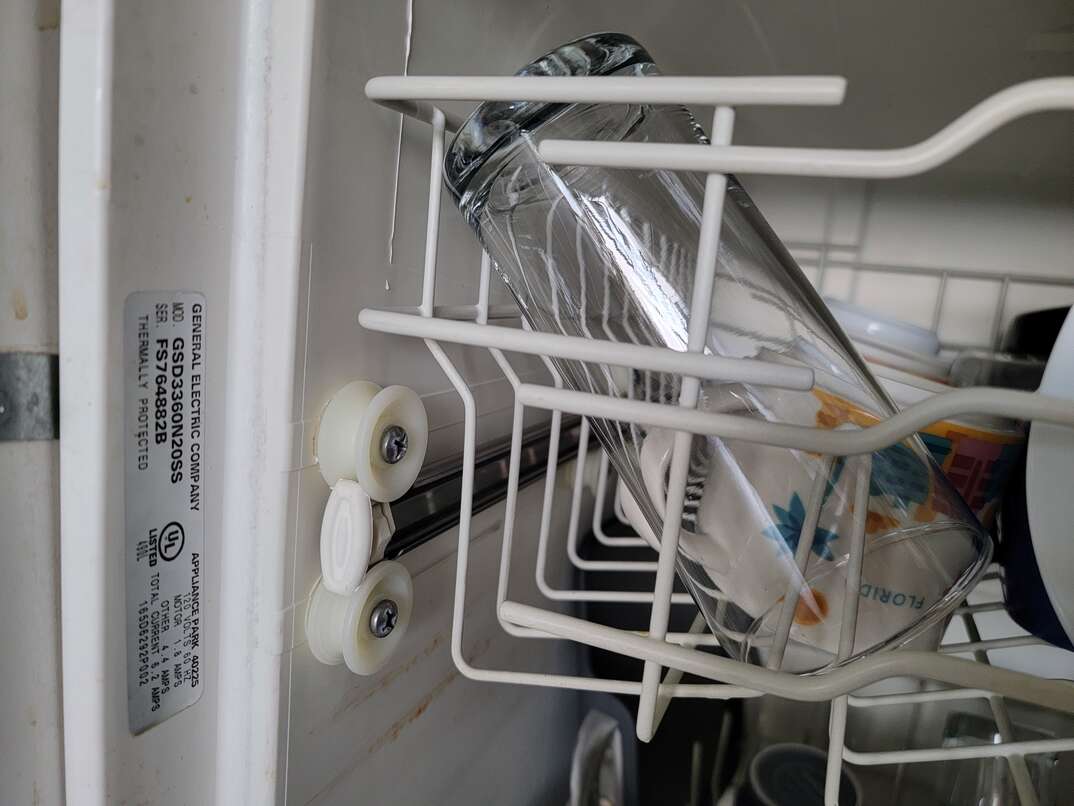Why Is My Dishwasher Leaving Residue on My Dishes?

What happens when your dishwasher does a worse job cleaning the plates and silverware than your kids?
Hand-washing your dishes isn't the only option to deal with your dishwasher leaving white residue on everything.
Why Is My Dishwasher Not Cleaning and Leaving Soap Residue?
Your first instinct might be that something's wrong with the dishwasher and it needs to be replaced. However, sometimes a dishwasher leaving white residue on everything just needs a little help. Here are some possible causes of white residue on your dishes:
- Hard water: Many areas have hard water, which means the water has high mineral levels. Hard water can leave mineral deposits on dishes that look white and cloudy and affect your dishwashing soap. The detergent might not suds up and clean well.
- Water temperature: If the water is too cold, it can't properly dissolve the dishwasher detergent, which could leave soap residue behind.
- Water pressure: Low water pressure could affect how well the dishwasher can rinse off the soap. This can happen if you use the wrong size hose or the hose becomes kinked.
- Detergent issues: The quality and amount of dishwasher detergent you use can affect the results. Low-quality detergents might not clean or rinse off well. If you use too much detergent, the machine might not be able to rinse all of it away, which could cause white residue.
- Sprayer issues: If the sprayer arms can't rotate and work properly, they won't be able to rinse off the soap well. Make sure nothing is blocking them.
The white residue on dishes generally isn't harmful to you. It's typically either undissolved dish soap or mineral deposits. You can often wipe or rinse off the residue if you're concerned about using the dishes.
More Related Articles:
- How Much Does Appliance Repair Cost?
- Should I Get the Extended Warranty When I’m Buying an Appliance?
- Scratch-and-Dent Appliances: What to Know Before You Buy
- Why Does My Dishwasher Smell?
- My Washing Machine Won’t Drain! Here are 3 Ways to Fix It
How to Get Rid of White Residue in the Dishwasher
There are ways to get rid of the white residue in your dishwasher. Here are some tips:
- Upgrade your detergent: If you're using a cheap or low-quality detergent, try a higher-quality brand. You can also try different types of detergent, such as liquid versus powdered, to see if you get better results from one than another. If you have hard water, look for detergent designed for use with hard water.
- Watch your detergent amounts: Cut back on the amount of dishwasher soap you put in the machine if you tend to go overboard. Read the instructions in your dishwasher manual to see how much you should be putting in.
- Add a rinse aid: These specialty products can help the appliance rinse the soap well. Rinse aids can be helpful with hard water, too.
- Clean your dishwasher: If you have hard water, cleaning out your dishwasher regularly can help reduce buildup. You can do this by running a cycle with vinegar in the machine. Wiping down the interior and cleaning the spraying arms can also help. The sprayer arms can get food particles and other debris in the holes, which can cut down on how well they rinse.
- Install a water softener: A more expensive solution for hard water is installing a water softener. This helps improve your dishwasher's performance and can reduce mineral buildup in other areas throughout your house.
- Load the dishwasher properly: Overloading the dishwasher can make it more difficult for the machine to rinse things properly. Group similar things together and avoid overstuffing the appliance for the best result.
- Check the water temperature: The suggested water temperature range is between 120 and 150 degrees Fahrenheit. If the water from your faucet doesn't reach at least 120 degrees, you might need to adjust your water heater to a higher setting. You can also give the dishwasher a head start by running the hot water in your kitchen sink before you turn on the dishwasher. This ensures the hot water has reached that area of the home.
You can start with the less expensive options and work your way up to more costly solutions as you investigate your dishwasher residue issues.
Elocal Editorial Content is for educational and entertainment purposes only. Editorial Content should not be used as a substitute for advice from a licensed professional in your state reviewing your issue. Systems, equipment, issues and circumstances vary. Follow the manufacturer's safety precautions. The opinions, beliefs and viewpoints expressed by the eLocal Editorial Team and other third-party content providers do not necessarily reflect the opinions, beliefs and viewpoints of eLocal or its affiliate companies. Use of the Blog is subject to the
Website Terms and Conditions.The eLocal Editorial Team operates independently of eLocal USA's marketing and sales decisions.



